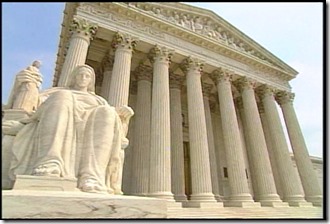Sharp new critique of same-sex marriage rulings
Three judges of the U.S. Court of Appeals for the Ninth Circuit, sharply protesting a three-judge panel’s October ruling in favor of same-sex marriage in two states, argued on Friday that courts at that level of the federal judiciary have no authority to decide that question. The Supreme Court, those judges argued, took away that power forty-two years ago.
The critique, one of the strongest dissenting statements yet issued amid a wave of federal and state court rulings striking down bans on same-sex marriages, came as the en banc Ninth Circuit refused to reconsider the panel’s combined decision in cases from Idaho and Nevada. Circuit Judge Diarmuid F. O’Scannlain wrote the dissenters’ opinion, joined by Circuit Judges Johnnie B. Rawlinson and Carlos T. Bea. It is unclear how many judges on the full court voted to deny rehearing.
Perhaps by coincidence, the fervent judicial protest came on the same day that the Supreme Court considered anew whether it should step in now to resolve the constitutional controversy over same-sex marriage. (The Justices examined that issue in private Friday but did not act on it.) The O’Scannlain opinion bluntly argued that “the same-sex marriage debate is not over.” It could have the effect of building resistance within the Supreme Court to moving soon toward a nationwide ruling in favor of such unions.
The heart of the dissent was its argument that lower courts are still bound by the Supreme Court’s one-line decision in 1972 in the case of Baker v. Nelson, declaring that a claim to same-sex marriage did not raise “a substantial federal question.” Judge O’Scannlain wrote that the Baker precedent remains binding on lower courts, and he added that the Supreme Court had made clear that “federal courts must avoid substituting their own definition of marriage for that adopted by the states’ citizenry.”
The dissenting opinion used much stronger language than a majority of the U.S. Court of Appeals for Sixth Circuit had used in November in upholding bans on same-sex marriage in four states — an opinion that also had relied upon the Baker precedent.
Judge O’Scannlain did make some of the same other points that the Sixth Circuit panel’s majority had, such as the argument that an issue as sensitive as same-sex marriage should be left to the people and the state legislatures to resolve, and that it will be better for the nation and for its people to have it worked out by representative government rather than by the courts.
The panel’s decision in the Idaho and Nevada cases, Judge O’Scannlain wrote, “shuts down the debate, removing the issue from the public square. In doing so, it reflects a profound distrust in — or even a downright rejection of — our constitutional structure.”
The Ninth Circuit dissent, though, added another point that went beyond the Sixth Circuit’s ruling against same-sex marriage. The dissenters said that the courts simply have no authority to decide any question about marital policy, because there is a flat “domestic relations exception” to federal court jurisdiction over that field of law, since it is to be left to the states.
That notion dates all the way back to a Supreme Court decision in 1890 in the case of In re Burrus. That jurisdictional argument, although picked up by some state attorneys general in recent same-sex marriage cases, had not been embraced by any court as a reason not to rule on the constitutional issue. It has received some recent support in academic literature.
The three-judge panel decision so forcefully opposed by the dissenters Friday was written by Circuit Judge Stephen Reinhardt. He and Judge O’Scannlain have been long-time philosophical adversaries on the Ninth Circuit. Judge Reinhardt’s opinion for a panel majority against the Idaho and Nevada bans went further in its constitutional reasoning than any other federal court had in the lengthy series of decisions against state bans.
The Ninth Circuit took almost three months to reveal its vote on whether it would reconsider the panel decision before a full eleven-judge court. The governor of Idaho had asked for such a rehearing of the case involving that state’s ban, as had the Coalition for the Protection of Marriage, a group opposed to same-sex marriage, in the Nevada case. State officials in Nevada had abandoned a defense of their state’s ban.
The Idaho governor and the state’s attorney general have filed separate petitions asking the Supreme Court to review the Ninth Circuit’s panel decision. Those petitions were not among those that the Justices considered at their private Conference on Friday, because they were not yet ready to be submitted to the Justices.
Recommended Citation: Lyle Denniston, Sharp new critique of same-sex marriage rulings, SCOTUSblog (Jan. 10, 2015, 7:46 AM), http://www.scotusblog.com/2015/01/sharp-new-critique-of-marriage-rulings/

